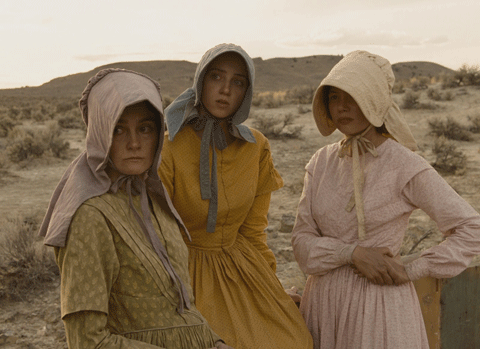 ANYTHING BUT MEEK In Kelly Reichardt's 2010 film, Meek's Cutoff, the women (l to r: Shirley Henderson,
Zoe Kazan, and Michelle Williams) become restive. |
The films of Kelly Reichardt examine political and socioeconomic tumult in the midst of intense, occasionally overwhelming quietude. The director, one of the most admired and resourceful voices in American independent cinema, appears at the Portland Museum of Art Friday night to participate in a weekend-long retrospective of her three most recent films.
Reichardt will discuss her latest work, 2010’s Meek’s Cutoff. It is set in 1845, and follows three couples venturing westward over the Cascade Mountains under the leadership of an obstinate, unreliable trail guide. 2008’s Wendy and Lucy (showing Saturday) is also concerned with a woman heading west: Michelle Williams’s Wendy has left her family in Indiana in order to find work at a fish cannery in Alaska, but she loses her dog and most of her budget during a pit stop in Oregon. In Old Joy, from 2006 and playing Sunday, two old friends reunite and tiptoe around the imperceptible damage that both time and distance have wreaked upon their relationship.
However modest in premise, the defining characteristic of Reichardt’s cinema is its quietly bold insistence that class and politics play a dominant role in our social relations. Old Joy and Wendy and Lucy, in particular, have become potent historical documents. By way of its protagonist, the former unearths the age of defeatist liberalism before the rise of congenial, Obama/MSNBC-era progressivism. Daniel London’s expectant father Mark is coded as the pragmatic humanist, listening to Air America before he picks up Will Oldham’s Kurt for a hike. Kurt, a likable drifter, makes pained, earnest attempts to recover the old spark in their bond, but Mark is incapable of reciprocating. Reichardt shrewdly, imperceptibly alters our sympathies over the course of the film: at first, we chortle at Kurt’s rootlessness; later, we are devastated by Mark’s lack of empathy. Its memorable final shots exacerbate the crisis of where our emotional and ideological sympathies should lie.
Wendy and Lucy is blunter but equally fraught. Released, by chance, in the nadir of the 2008 financial crisis, the film brutally chronicles the ways in which an insensitive bureaucracy has pervaded American culture. Wendy’s shoestring budget comes unraveled over the course of two days in an anonymous town, as car trouble and run-ins with self-proclaimed authorities force her to increasingly desperate actions in order to partake of fundamental needs, such as food and sleep. Wendy’s purgatory feels overdetermined, but Reichardt’s attempt to portray a rigged social ladder remains commendable.
Understated in their formalism, these two films are devoted to the details of lived experience, but they’re positively breezy when compared to Meek’s Cutoff, Reichardt’s forbidding, austere masterpiece. Filmed in the boxy, “Academy ratio” of classic Hollywood westerns, the movie upends the mythology of that genre: Reichardt’s travelers become trapped in an unending landscape, and the film is devoted to their quotidian struggles. Much of the film consists of producing food, building fires, and rationing belongings. (Nothing if not withholding and audience-unfriendly, the film consists of many distant long shots, and is more or less resistant to home viewing.)